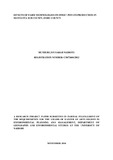| dc.description.abstract | This study is an investigation of Sweet potato (Ipomoea batatas (L.) Lam.) production technologies among smallholder farmers in Manyatta Sub County of Embu. The main problem behind this study is the growing importance of sweet potato as food security crop and the very little attention it receives at policy level. Several technologies exist that can enhance production and the study sought to assess the extent of use of these technologies which include; irrigation, ridging, the use of certified vines and fertilizer application. The objectives of the study were; to identify the production technologies currently being used, to investigate the challenges to sweet potato production and to assess the effects of sweet potato production to households in Embu County. The study was carried out in 10 sweet potato growing sub locations within Manyatta, which included Dallas, Kamiu, Njukiri, Nthambo, Kiangima, Itabua, Mbuvore, Manyatta, Gatunduri, and Kithimu in Nembure division. Using a case study research design, purposive and random sampling of sweet potato growing farmers, and through the use of questionnaires, interviews and observation as sources of data, the data was collected from a sample of 381 sweet potato growing farmers. The study observed that adoption decisions were influenced by socioeconomic (age, gender, education, farm size), ecological (agro ecological zones, temperature, rainfall, altitude, pH of soil/ water) and institutional factors (extension services from government and NGOs). The analytical tools included cross tabulation, simple correlation and the use of percentages. The findings of the study show that most farmers had adopted improved varieties (Bungoma, Kenspot 2, 3, 4 and Kemb 10 which are high yielding, highly consumed, early maturing, resistant to drought, pests and diseases) therefore increasing yield. Hypothesis test showed that „there is a relationship between the technology applied and the sweet potato yield. The study also found out that, setting up community managed nurseries; including knowledge on rapid multiplication techniques and quality maintenance of planting materials were the key for sustainability. The study concluded that adoption of modern technologies was crucial for sweet potato production. This increased yield and provided a supplementary source of income and food self-sufficiency. The study recommended that more research work to be carried out on sweet potatoes, empower farmers on value addition for their products as this would change their attitude towards economic viability of sweet potato production and create avenues for easier access to clean planting material. | en_US |



